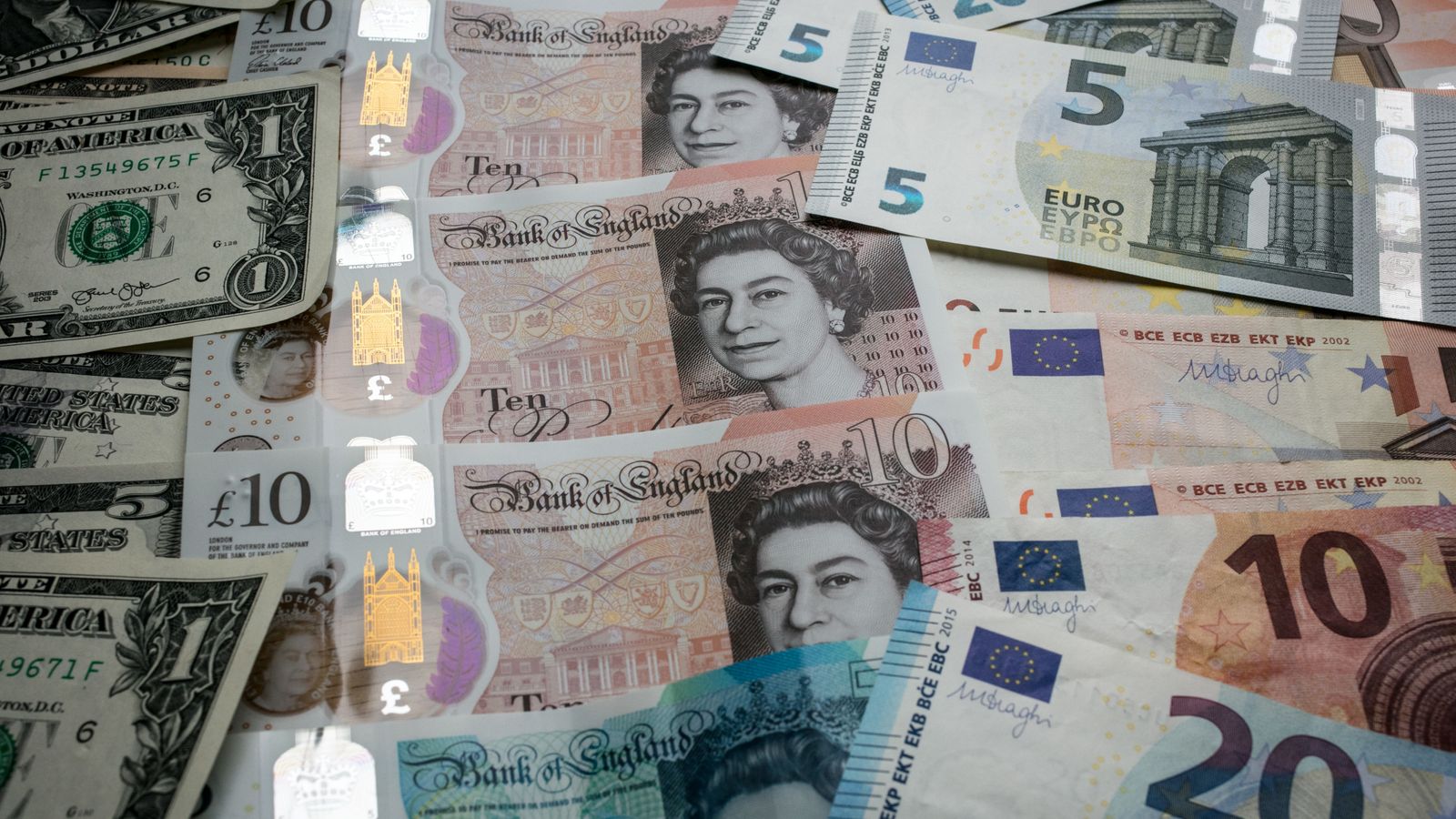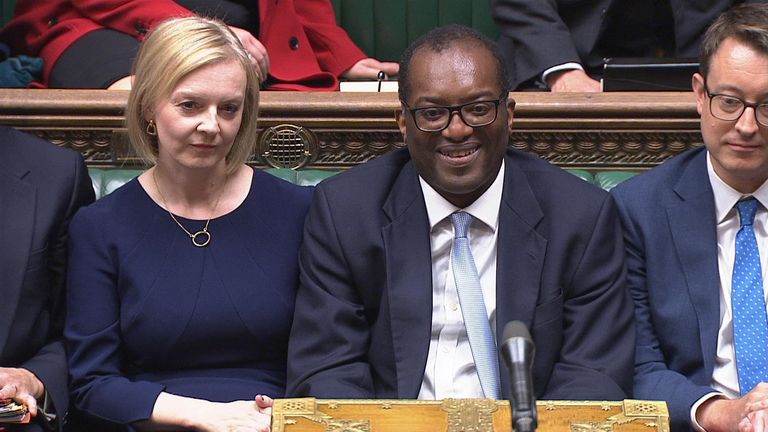The Bank of England says it “will not hesitate to change interest rates as necessary” after markets reacted badly to the chancellor’s tax-cutting mini-budget.
In a statement, the Bank said it was “monitoring developments in financial markets very closely in light of the significant repricing of financial assets”.
It came after the pound fell to a record low against the dollar, sparking market speculation that the regulator may be forced to intervene and raise interest rates further than previously announced.
The Treasury also attempted to calm market fears by outlining when it is to provide detail on its growth plan, but both announcements only resulted in the pound recommencing its slide to the lows of Monday morning. After stabilising at around $1.08 on Monday afternoon, still down on Friday morning before the mini-budget, the pound dropped swiftly and landed at around $1.06.
Chancellor Kwasi Kwarteng is to set out a “medium-term fiscal plan” on 23 November, the Treasury said in a statement on Monday afternoon.
The body tasked with providing independent economic forecasts and analysis for budgets, the Office for Budget Responsibility (OBR), is to provide its forecasts alongside the November fiscal plan announcement, the Treasury added.
The body did not provide analysis and forecasts for last Friday’s mini-budget as it was not a traditional budget.
An OBR forecasted budget will also take place in the spring, the Treasury said. In the meantime, it added, ministers will announce further measures, meant to increase growth, in October and early November.
Next interest rate hike could be highest in decades – live updates
Earlier on Monday, sterling slipped by nearly 5% to $1.0327 – below the previous all-time low against the dollar set in February 1985 – after Mr Kwarteng unveiled the most extensive programme of tax cuts for 50 years.
The £45bn tax-slashing package saw the market deliver a verdict on the sustainability of the public finances, given the additional demands it will place on government borrowing. There are concerns that the tax cuts could fuel inflation, something the Bank of England has vowed to keep under control.
Bond markets also continued to reflect the crisis of confidence, with the rates being demanded in return for investor cash hitting levels not seen since 2008.
A low pound will make importing goods in dollars more expensive, which will be passed to consumers.
The RAC’s fuel spokesman, Simon Williams, said: “A falling pound is bad news for drivers at the pumps because wholesale fuel, like oil, is traded in dollars.
“Fortunately, wholesale petrol and diesel costs have reduced in recent weeks due to the price of oil coming down which has led to lower prices at the pumps, but if oil were to go back up, the weak pound would definitely lead to drivers paying far more to fill up.”
The government’s growth plan was clearly the catalyst for Friday’s plunge. Still, traders said it had since intensified the focus more widely as the dollar also shot up against other international currencies.
The euro fell to fresh 20-year lows versus the dollar amid growing recession fears linked to the war in Ukraine and in the wake of Italy’s elections that will see a far-right leader become the country’s new PM.
The trouble for both the UK and Europe more generally is that weak currencies raise dollar-priced goods, raising import costs and fuelling inflation further.
The UK also faces goods from the continent becoming more expensive because the pound’s value has also slipped sharply against the euro, standing at €1.0948 – leaving it 10 cents lower since August.
‘We are facing national emergency’
The rise in government borrowing costs saw the yield on the benchmark 10-year gilt hit almost 4.1% – the highest since April 2010.
Analysis of Bank of England and Refinitiv data by the Reuters news agency suggested the yield was on track for its biggest rise in a calendar month since 1957.
Shorter-term bonds were at levels not seen since the financial crisis.
Shadow chancellor Rachel Reeves said at Labour’s party conference: “We are facing a national emergency.
“Energy prices up, the cost of the weekly food shop up, people’s wages not keeping up.
“On Friday, the chancellor had an opportunity to set out a serious response to the cost of living crisis. And he failed.”
Politics Hub: Tory MPs ‘already putting letters in’
The PM’s spokesman reiterated the government’s line that it would not comment on market moves or interest rates, adding it was important that Bank of England independence remains.
Mr Kwarteng suggested his announcements were just the beginning of the government’s agenda to revive the UK’s stagnant economy.
Read more:
PM going for broke in hope of winning big – but has she misjudged the public mood?
Chancellor defiant over ‘long-term growth plan’
Mr Kwarteng is reportedly considering abolishing a charge for parents who earn more than £50,000 and claim child benefit, increasing the annual allowances on pension pots, and a tax break for people who stay at home to care for children or loved ones.
If sterling fell to parity with the US dollar, it could trigger a rebellion among Tory backbenchers who could refuse to vote for the government’s finance bill or submit letters of no confidence, The Daily Telegraph reported, citing backers and critics of the prime minister.
Asked whether he was nervous about the dropping pound, falling stock markets and the rising cost of government borrowing, Mr Kwarteng said: “We’ve got to have a much more front-footed approach to growth and that’s what my Friday statement was all about.
“I think that if we can get some of the reforms… if we get business back on its feet, we can get this country moving, and we can grow our economy, and that’s what my focus is 100% about.”
He refused to comment on market movements, saying: “I’ve been focused on the longer term and the medium term, and I think it was absolutely necessary that we had a long-term growth plan.”


